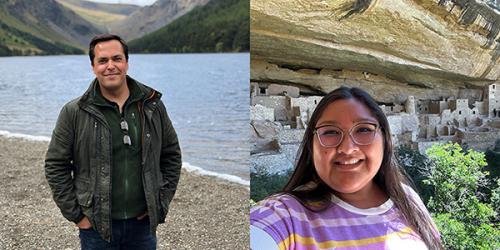Archaeology Day Lecture: Burden Basket Ceremonialism and Trajectories of Indigenous Basketry Change
-Event-

Start Date: Oct 19, 2023 - 06:30pm
Location: Hibben Center 105
On October 19 at 6:30 PM the Maxwell Museum of Anthropology will host Edward A. Jolie (UNM PhD, 2018; Arizona State Museum and School of Anthropology, University of Arizona) and Mowana L. Lomaomvaya (Hopi, Hotevilla, Arizona) for Anthropology Day. They will present their talk Burden Basket Ceremonialism and Trajectories of Indigenous Basketry Change in the Northern U.S. Southwest, ca. AD 900 – Present which will be follwed by a reception in the Maxwell Museum of Anthropology.
Recent scholarship highlights the remarkable antiquity and dynamism of Indigenous religious practices across the U.S. Southwest. Examination of museum collections, radiocarbon dates on perishable material culture, and scrutiny of ethnographic records points to the interconnectedness of new technologies and likely shifting cultural boundaries in the evolution of ritual practices with concrete links to contemporary Puebloan practices. Burden baskets, variously used in the transport of foodstuffs, fuel, and other products are, by at least the A.D. 1000s, implicated in significant ceremonialism at Pueblo Bonito in Chaco Canyon, New Mexico, and beyond. Surviving archaeological examples of burden baskets and effigies molded in clay evidence strong symbolic connections to women's productive and reproductive labors and have been taken to suggest the emergence of a prominent woman's sodality. Here we invoke observations on variability in ancient burden baskets, ceramic effigies, and rock image depictions of those effigies to offer a reconstruction of basket-centered ceremonialism and its transformation over subsequent centuries against the backdrop of wider social and cultural changes in the northern U.S. Southwest. The resulting narrative articulates both continuity and change in women’s ritual practices involving basketry while suggesting broader implications for understanding the origins of distinctive historic Hopi, and neighboring Pueblo, basketry traditions.
Recent scholarship highlights the remarkable antiquity and dynamism of Indigenous religious practices across the U.S. Southwest. Examination of museum collections, radiocarbon dates on perishable material culture, and scrutiny of ethnographic records points to the interconnectedness of new technologies and likely shifting cultural boundaries in the evolution of ritual practices with concrete links to contemporary Puebloan practices. Burden baskets, variously used in the transport of foodstuffs, fuel, and other products are, by at least the A.D. 1000s, implicated in significant ceremonialism at Pueblo Bonito in Chaco Canyon, New Mexico, and beyond. Surviving archaeological examples of burden baskets and effigies molded in clay evidence strong symbolic connections to women's productive and reproductive labors and have been taken to suggest the emergence of a prominent woman's sodality. Here we invoke observations on variability in ancient burden baskets, ceramic effigies, and rock image depictions of those effigies to offer a reconstruction of basket-centered ceremonialism and its transformation over subsequent centuries against the backdrop of wider social and cultural changes in the northern U.S. Southwest. The resulting narrative articulates both continuity and change in women’s ritual practices involving basketry while suggesting broader implications for understanding the origins of distinctive historic Hopi, and neighboring Pueblo, basketry traditions.
